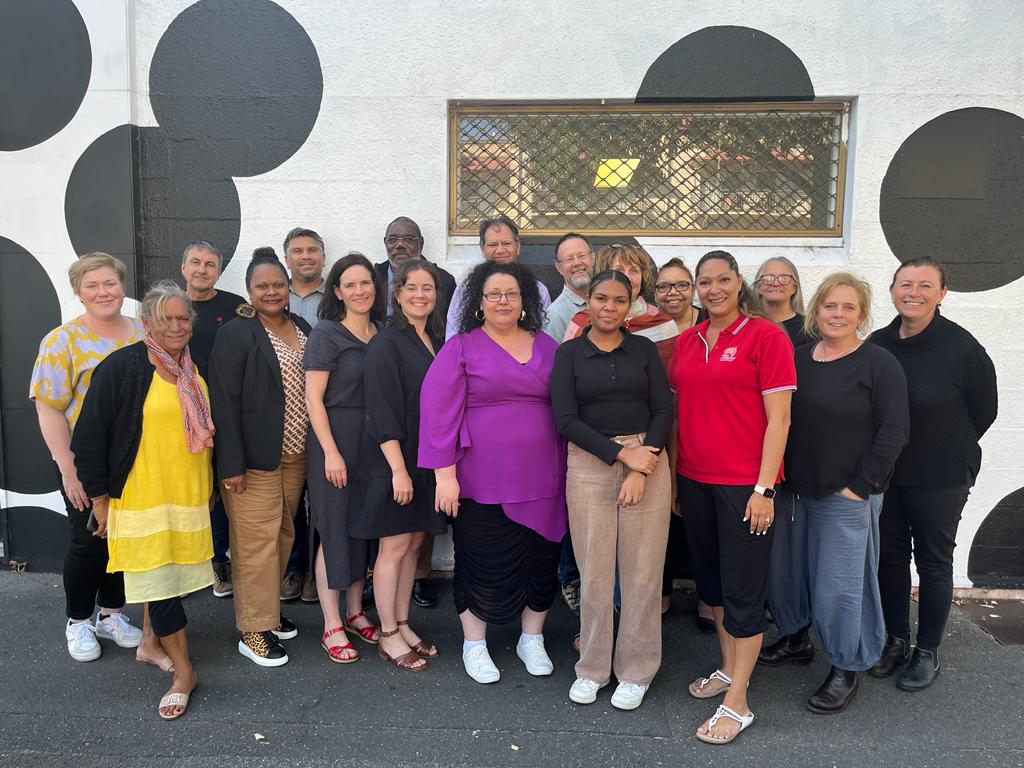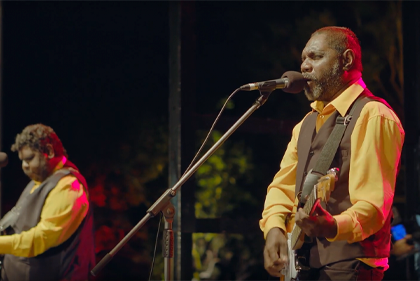National Indigenous Languages Convention
The National Indigenous Languages Convention was held on Friday 23 February 2018, bringing together community members, language workers, industry partners, educators and government to explore how digital technologies can be used to preserve and pass on Aboriginal and Torres Strait Islander languages.
Through innovative displays, inspiring speakers and passionate delegates, the Convention showcased firsthand a range of community-led initiatives and encouraged robust discussion about future possibilities.
Hear from some of our delegates about the importance of language across communities and from the presenters on the day about how technology can support language revival.
Wrap up
Through innovative displays, inspiring speakers and passionate delegates, the Convention showcased firsthand a range of community-led initiatives and encouraged robust discussion about future possibilities.
The presentations and discussions from the Convention encompassed key themes around digital projects, intellectual property, education resources, art and culture, and philanthropic partnerships. The images below are from visual listener, Devon Bunce, who was illustrating the discussions taking place at the Convention.
For more information about the Australian Government’s election commitment visit Protect, preserve and celebrate Indigenous languages page.
What languages do you identify with?
Former AIATSIS Chairman, Professor Mick Dodson, once commented that previous surveys on Aboriginal and Torres Strait Islander languages painted a complex picture.
Across the country, people are identifying with or speaking different traditional Aboriginal and Torres Strait Islander languages to different extents: in some places people may be using a traditional Aboriginal or Torres Strait Islander language for everyday communication. In other places people may be re-learning their Aboriginal or Torres Strait Islander language. In some places people may be identifying with or speaking more than one Aboriginal or Torres Strait Islander language.
In addition, urbanisation has meant that many Aboriginal and Torres Strait Islander people no longer live in the heartlands of their ancestors.
Despite this complex and evolving picture, language continues to be central to one’s sense of identity and belonging. In a submission to Parliament in 2012, A. Turner of the Artepe Aboriginal Corporation said:
“Language is what we know of people – we know of him or her. If they speak my sacred language, I must be related to their kinships. Language is how people identify themselves. Being you is to know your language.”
So tell us, what languages do you identify with? Take the survey below! (It should take about 10 minutes to complete)
International Decade of Indigenous Languages Directions Group
The International Decade of Indigenous Languages Directions Group is working in partnership with the Australian Government on initiatives for the UNESCO International Decade of Indigenous Languages 2022–32.

The Office for the Arts has established the International Decade of Indigenous Languages Directions Group (Directions Group) to shape Australia's participation in the UNESCO International Decade of Indigenous Languages 2022–2032 (the International Decade). The Directions Group was formed through an Expression of Interest (EOI) process that received 58 applications assessed by a panel that included key First Nations stakeholders.
The Directions Group is comprised of 18 members: 13 Aboriginal and Torres Strait Islander members, including two members representing First Languages Australia; and five ex-officio members from key Government agencies (the Office for the Arts (OFTA), Australian Institute of Aboriginal and Torres Strait Islander Studies (AIATSIS), the Department of Foreign Affairs and Trade (DFAT), the National Indigenous Australians Agency (NIAA) and the Department of Education).
One of the key activities of the Directions Group has been to develop the Australian National Action Plan for the International Decade in partnership with Government, as well as provide strategic policy direction and work on key projects, such as planning for an Australian launch event.
Meetings
The Directions Group have met virtually on a regular basis since they commenced in 2022. They have met in person three times:
- Ngunnawal country (Canberra), in May 2022
- Mparantwe (Alice Springs), September 2022
- Kaurna country (Adelaide), March 2023.
Communiques from the Directions Group's in-person meetings can be found below.
Australia's International Decade of Indigenous Languages Directions Group's first meeting in Canberra, May 2022.

Canberra Meeting: First Nations members of the Directions Group pictured left to right: Phillemon Mosby, Denise Smith-Ali, Vicki Couzens, Jillian Mundy, Daryn McKenny, Shania Armstrong, Annalee Little, Gawura Wanambi, Joyce Bonner and Beau Williams.
Missing from the Photo: Clayton Cruse, Lorraine Injie and Desmond Crump.

Mparantwe Meeting: Members of the Directions Group pictured with Arrernte elder Sabella Turner left to right: Jillian Mundy, Michelle Manning (NIAA), Joyce Bonner, Annalee Little, Sabella Turner, Pauline Halchuk (OFTA), Beau Williams, Michelle Bedford (DFAT), Shania Armstrong, Clayton Cruse, Denise Smith-Ali, Sarah Davis (OFTA), Liam Tucker (OFTA), Lorraine Injie, Lauren Reed (AIATSIS) and Daryn McKenny. Missing from photo Dr Vicki Couzens, Phillemon Mosby, Desmond Crump and Gawura Wanambi.

Kaurna country meeting: Members of the Directions Group and Secretariat left to right: Sheridan Williams (OFTA), Joyce Bonner, Daryn McKenny, Leitha Assan, Clayton Cruse, Sarah Davis (OFTA), Gawura Wanambi, Marrianne Schafer-Gardiner (Education), Juliette Hubbard (NIAA), Desmond Crump, Doug Marmion (AIATSIS), Shania Armstrong, Pauline Halchuk (OFTA), Michelle Bedford (DFAT), Annalee Little, Dr Vicki Couzens Jillian Mundy, Lauren Reed (AIATSIS). Missing from photo Beau Williams, Denise Smith-Ali, and Lorraine Injie.
Since the Directions Group was established at the beginning of 2022 they have:
- developed their Terms of Reference and determined their values and vision for languages
- drafted the Directions Group Indigenous Languages Priorities Paper and Priorities Paper on a page
- co-authored Voices of Country—Australia's National Action Plan for the International Decade. The Action Plan focuses on five key themes for the Decade—the five themes are:
- 1. stop the loss
2. Aboriginal and Torres Strait Islander communities are centre
3. caring for Country
4. intergenerational knowledge transfer
5. truth telling and celebration. - Guided Australia's launch of the International Decade of Indigenous Languages
If you have any enquiries regarding the Directions Group please emailIndigenousLanguagesSecretariat@arts.gov.au.
For more
Documents
- Terms of Reference
- First Communique
- Second Communique
- Third Communique
- Directions Group Indigenous Languages Priorities Paper
- Priorities Paper on a Page
The Australian Government acknowledges the Traditional Custodians of Country throughout Australia and their continuing connections to land, waters and communities. We pay our respect to Aboriginal and Torres Strait Islander cultures and Elders past, present and future.



















